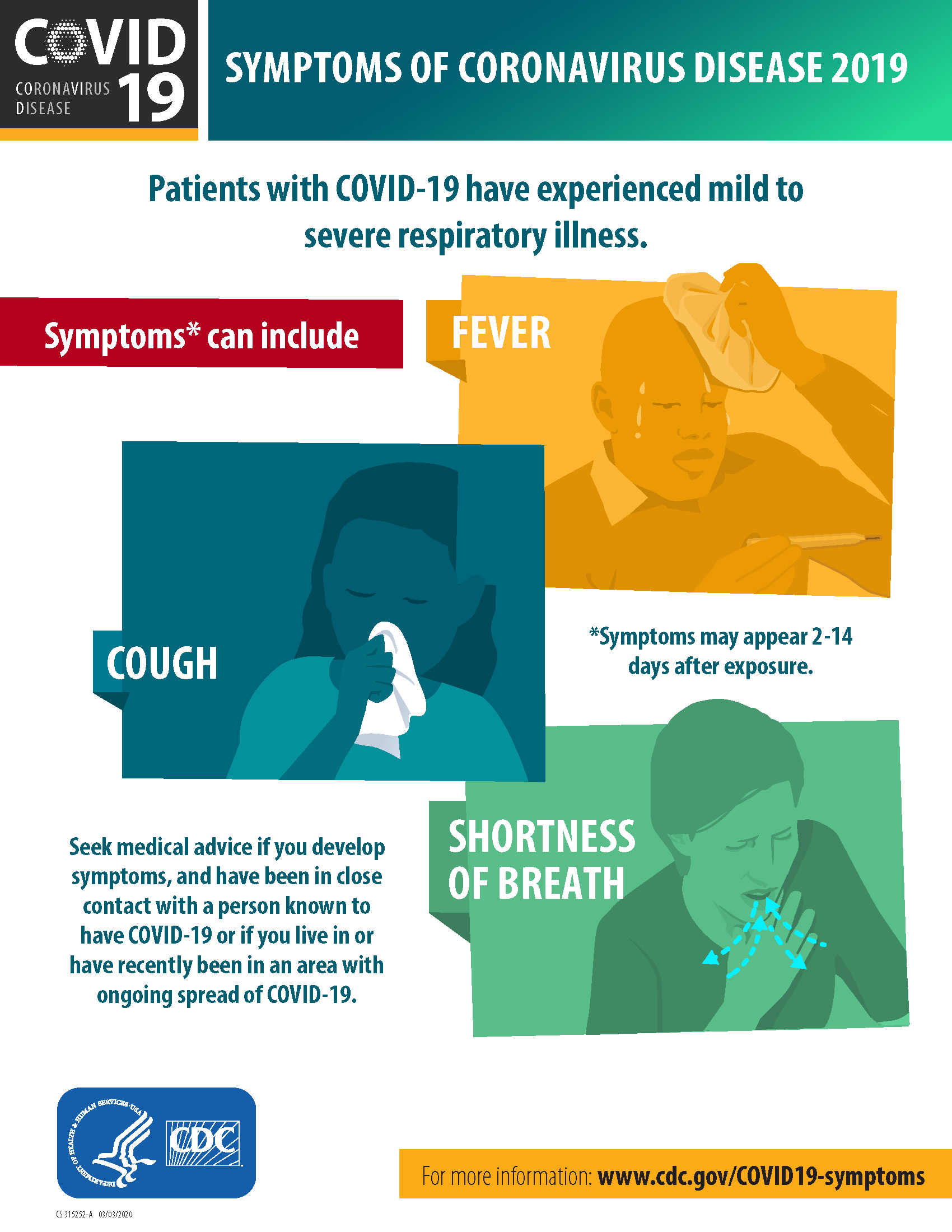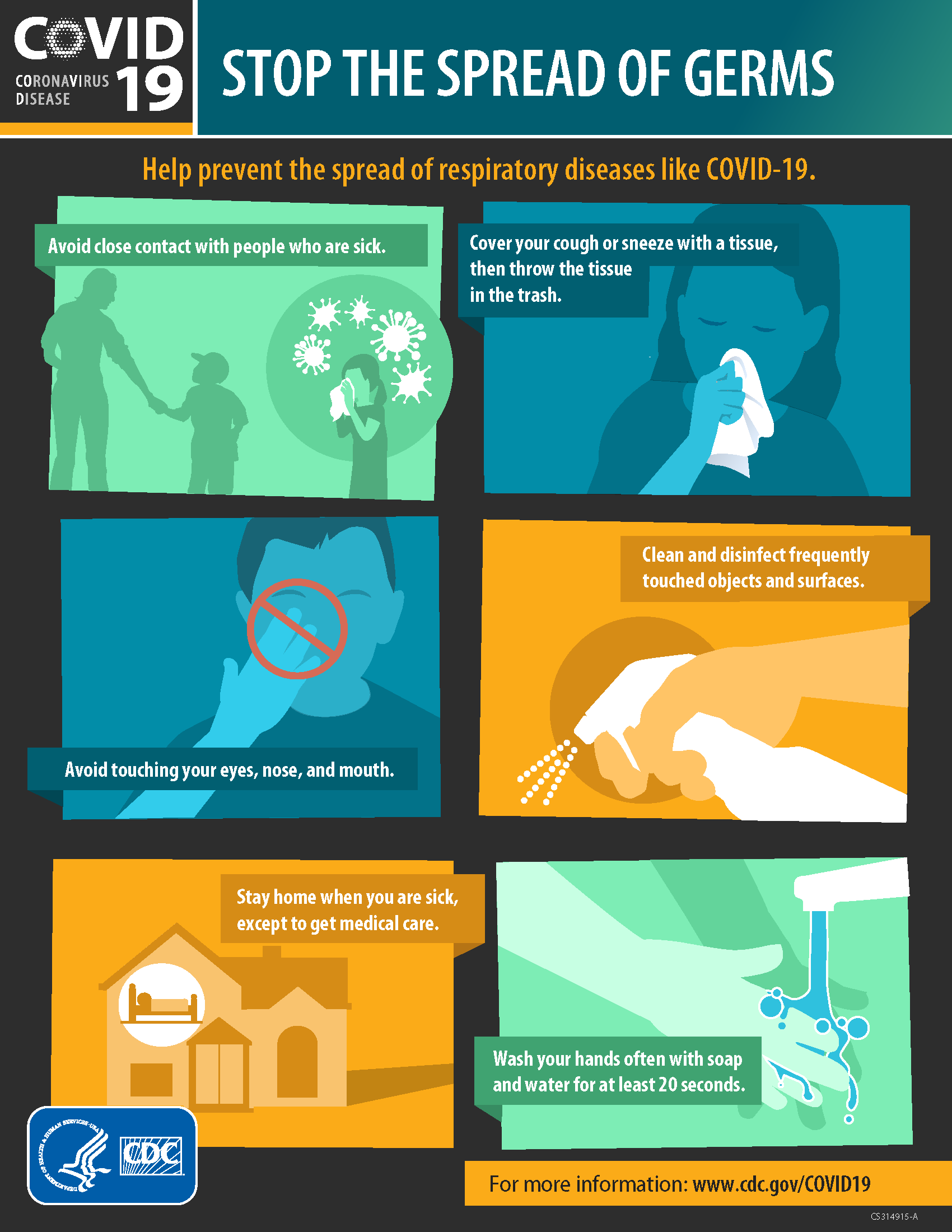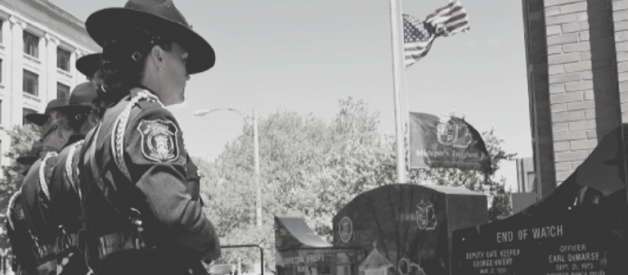Anyone can publish on Medium per our Policies, but we don?t fact-check every story. For more info about the coronavirus, see cdc.gov.
Those with questions about parole, healthcare or programming for prisoners, correctional facility operations or other corrections-related issues can call the numbers listed below for more information. Please call the number for the section that most appropriately applies to your issue.
Please do not leave a message on more than one phone line. This will slow down our ability to respond in a timely manner to your concern. Due to a high call volume, numbers may go to voicemail. Please leave a message and a representative from the specific program area will return your call as soon as possible.
If you have questions about the early release of a prisoner, please know that the MDOC has no legal authority to release prisoners prior to their earliest release date because of Truth in Sentencing laws, which require those sentenced to prison to serve their entire minimum sentence before they can be paroled.
If you are trying to reach an incarcerated loved one, please contact the correctional facility where the prisoner is housed. You can find a list of all MDOC correctional facilities and their contact information here. Prisoners continue to have access to phones and electronic messaging in order to contact family and friends.
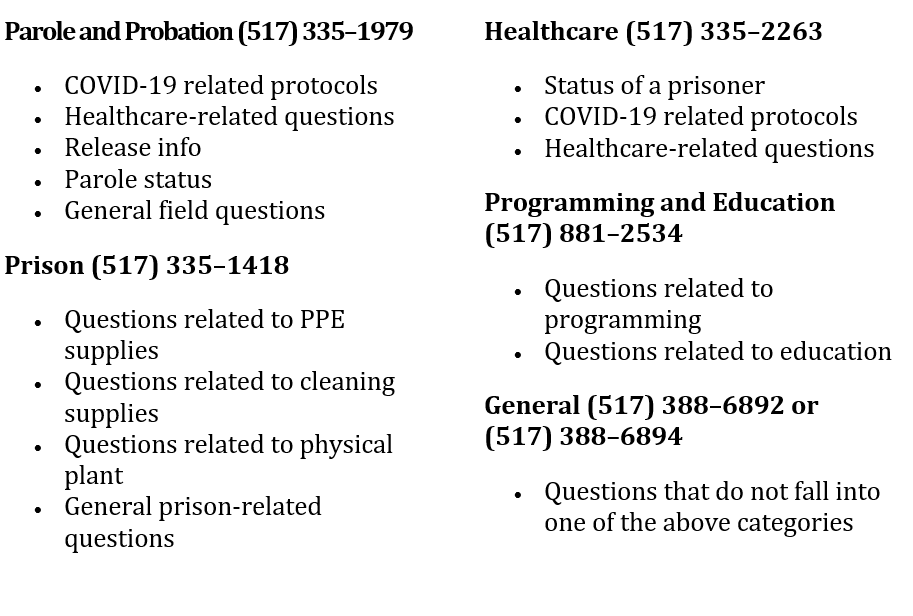
The Michigan Department of Corrections is committed to ensuring the safety and well-being of staff, the public and those under our supervision.
You can click here to find information that will help address many commonly-asked questions regarding the MDOC?s response to coronavirus (COVID-19) and preventative steps we?re taking to help protect the health of employees, prisoners and those in the community.
Mourning the loss of Michigan Department of Corrections staff
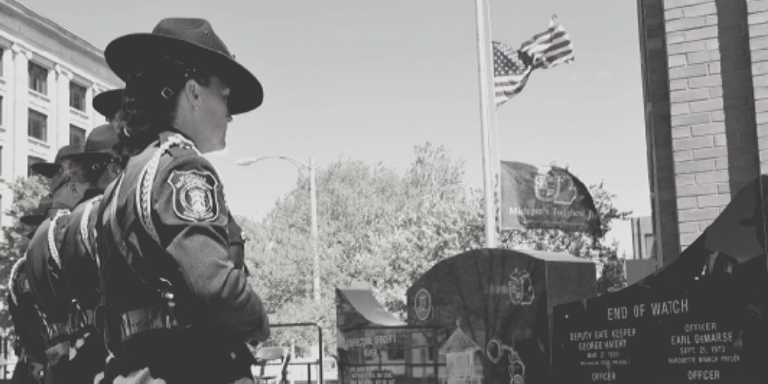
Corrections staff are courageous. They never hesitate to help others in need, regardless of the situation, and show an unending commitment to protecting the citizens of our state safe.
We mourn the loss of three corrections professionals, a corrections transportation officer, a word processing assistant at the Lahser Probation Office in Detroit, and a corrections officer who passed away after contracting coronavirus (COVID-19).
Their dedication to the safety of all Michigan residents will not be forgotten. Our thoughts are with their family, friends and colleagues during this difficult time.
Remembering Prisoners who have Passed
The MDOC is sad to report there have been a total of 69 deaths of prisoners who had tested positive for COVID-19.
You can read more about prisoners who have passed away here.
Total Confirmed Prisoner and Staff Cases to Date by Location
Updated September 3, 2020? 5:30 p.m.
The department has been leading the nation when it comes to consistent testing of the prisoner population. Following the completion May 22, of testing prisoners at Michigan Reformatory in Ionia for COVID-19, the Michigan Department of Corrections completed its goal of testing every prisoner in its system.
Testing also continues daily at our facilities. When prisoners are set to parole, discharge or other such movements, they are tested again and are not moved until the test results return. So far, the MDOC has performed 69,292 tests, which is more than 2 percent of the total tests conducted of the general public statewide.
Data on cases and testing in the charts below will be updated Monday-Friday.
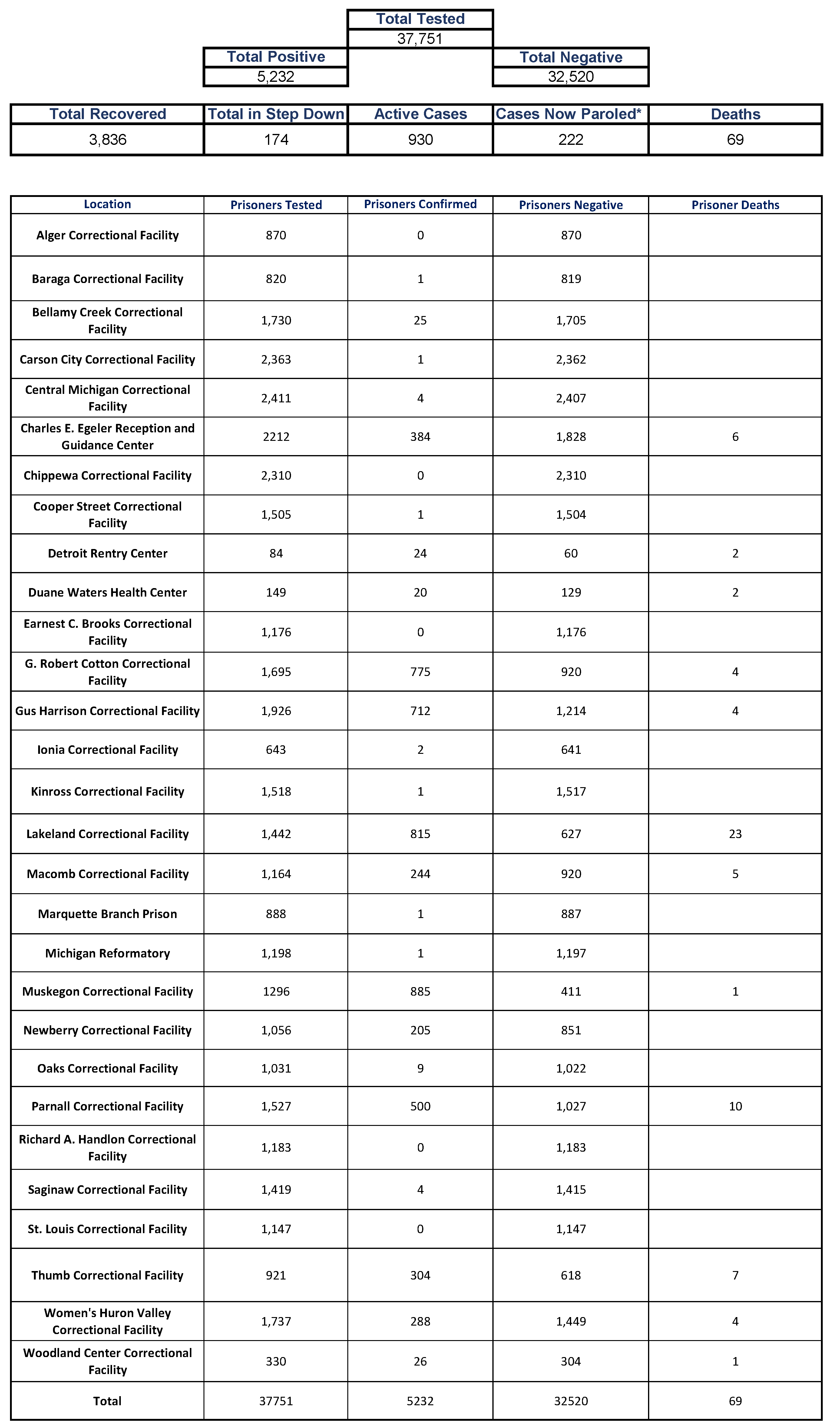
- *Cases now paroled indicates prisoners who tested positive and later paroled once health care determined they were no longer infectious.
- *According to the Michigan Department of Health and Human Services, an individual is considered ?recovered? once they have gone 30 days from the onset of symptoms.
- *Prisoners are considered in step-down status once they have been medically cleared by the MDOC?s chief medical officer, are symptom free and are no longer considered contagious. Step down numbers reflect prisoners currently in step-down status.
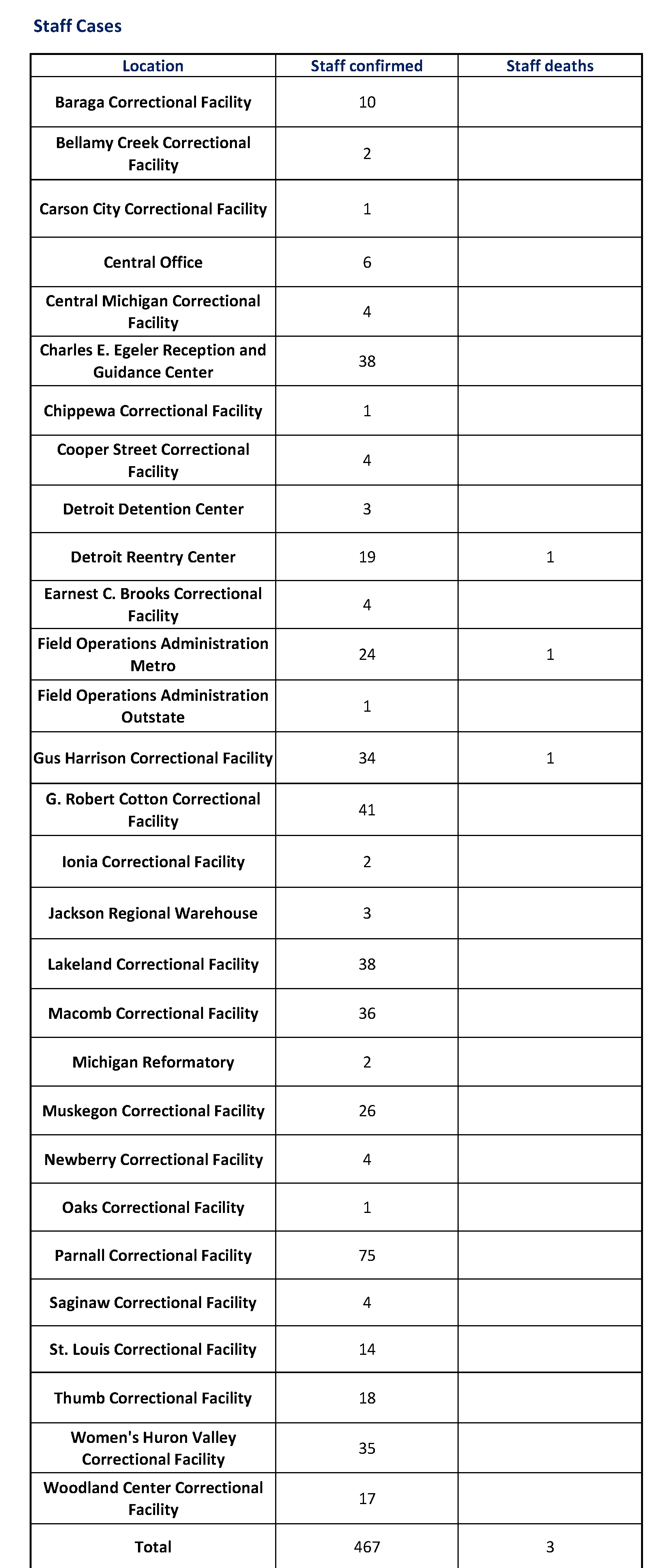
What the MDOC is doing in response
The Michigan Department of Corrections is taking a series of measures to protect its staff, the prison population and the community as positive cases of coronavirus disease 2019 (COVID-19) have been identified in the state.
There are now 104,395 cases of coronavirus disease 2019 (COVID-19) in Michigan as of September 3.
Information around this outbreak is changing rapidly. The latest information is available at Michigan.gov/Coronavirus and CDC.gov/Coronavirus.
Personal Protective Equipment, cleaning and mitigation measures
- Michigan State Industries has produced masks for all prisoners and correctional facility staff to wear. Each employee and prisoner received three masks each and the masks can be laundered and worn again. Facility staff are also permitted to bring their own PPE, such as masks, gloves and gowns. Staff are expected to wear their mask during their entire shift and prisoners are expected to also wear their masks at all times, except while eating, sleeping or showering. Michigan State Industries also manufactured gowns, protective eyewear and protective suits. Every facility was expected to receive a new order of MSI masks for both prisoners and staff as of late July. These are made of a lightweight material for use during the summer months. Prisoners will receive three each and staff will receive three each as well. FOA and Central Office staff will be receiving new masks as well.
- All MDOC staff transporting a prisoner on or off grounds are required to be dressed in full personal protective equipment (PPE), which is available for those employees.
- All facilities have received approval from the regional sanitation officer to use bleach during facility cleaning. Facilities have enhanced cleaning efforts and cleaning products are available to clean commonly-used areas and phones before and after use. Cleaning efforts have been doubled at facilities with vulnerable prisoner populations. We have increased our production of soap and ensured that all prisoner areas and bathrooms have plentiful access to soap. Soap has been distributed to prisoners and prisoners have been told that if they need more soap they only need to ask. Additional soap will be provided at no charge. CDC posters detailing proper hygiene practices have been posted in correctional facilities and have also been recreated digitally so they play on TV screens throughout our facilities. These are the same posters you will see in your community and throughout State of Michigan office buildings.
- Movements have been modified to help facilitate social distancing and the number of prisoners attending classes and meals has been reduced so prisoners can be seated farther apart. Prisoners and staff are frequently reminded of the need for social distancing and prisoners are instructed not to gather in groups on the yard. Activities such as basketball and weight pit have been suspended to encourage social distancing, as well. There are also markers and cones set up for med lines and in the chow hall as a visual reference for prisoners on how far apart they should stand.
- The department has been leading the nation when it comes to consistent testing of the prisoner population. Following the completion Friday, May 22, of testing prisoners at Michigan Reformatory in Ionia for COVID-19, the Michigan Department of Corrections has completed its goal of testing every prisoner in its system.
- Staff and visitors can also access information about their facility by signing up for Nixle alerts. To sign up for Nixle alerts, go to www.michigan.gov/corrections and select the page for the correctional facility in your area to register via the Nixle Widget, or text the zip code of the facility you would like to receive updates from to 888777.
UPDATE: Visits and Transfers
- Visitation at facilities statewide was suspended as of March 13.
- After suspending visitation at all correctional facilities to protect the health of staff, prisoners, and the public, Director Heidi Washington convened a Visiting Operations Committee to develop recommendations for reactivating prisoner visits. The committee recommended establishing a pilot project to evaluate the use of video visitation technology and online scheduling of prisoner visits. The following MDOC Facilities will serve as pilot sites for video visitation: Women?s Huron Valley Correctional Facility (WHV); G. Robert Cotton Correctional Facility (JCF); Chippewa Correctional Facility (URF); Richard A. Handlon Correctional Facility (MTU); Ionia Correctional Facility (ICF); Parnall Correctional Facility (SMT); Duane Waters Health Center (DWH). The initial phases of the deployment involve the installation of infrastructure and device configuration at each pilot site. More information is located in the visitations section of this page below.
- The department worked with communication vendors GTL and JPay to provide enhanced services for prisoners to communicate with family and friends during the period without visits. JPay is continuing to offer two free stamps per week and a 10% discount on stamps through Aug. 31, 2020. GTL will again provide one free 5-minute phone call each week through the month of August. GTL?s internet and mobile fees are reduced with the regular $2.95 transaction fee reduced to $1.95 and the $1.95 transaction fee reduced to $0.95. GTL had previously provided one free, five-minute phone call each week for the first two weeks of May 2020 and, for the entire month of May. We will continue to work with the companies on anything else they may be willing to provide.
- In connection with visitation suspension, face-to-face college classes at all facilities have also been suspended effective immediately. The MDOC will work with higher education institutions willing and able to deliver classes as correspondence courses. Core programming and school classes taught by MDOC staff will continue.
- Outside contractors for substance abuse programming will be allowed inside and will be screened upon entry per the screening protocol. Attorney visits will continue to be authorized.
- During this time, transfers of prisoners or staff between facilities will not be authorized without the approval of the Assistant Deputy Director or higher.
- The department issued protocol to all county sheriff offices to offer guidance on screening and other preventative measures.
Quarantine and Care of Sick Prisoners
- Facility healthcare staff will meet with prisoners who have presented with symptoms of coronavirus. The MDOC does not make the diagnosis of the coronavirus. The department is following the Michigan Department of Health and Human Services protocol. If a prisoner has symptoms and meets the criteria for testing, the MDOC can test the prisoner.
- Prisoners who test positive for the virus are isolated from the general population and any prisoners or staff they have had close contact with are identified and notified of the need to quarantine.
- Prisoners who test positive may be transferred to the department?s designated quarantine unit at Carson City Correctional Facility. This unit is completely separated from the main facility, has limited movement and access to the unit is limited. Only a small number of designated staff work in the unit in 12-hour shifts to limit the number of people entering. Those staff members report directly to the unit and do not enter the main correctional facility. Prisoners transferred to the unit also stay on the unit and do not enter any other areas of the prison.
- Prisoners who have been identified as having close contact with another prisoner who tests positive, but have not tested positive for the virus themselves, will be isolated from the general population at their facility for the 14-day quarantine period.
- Co-pays for prisoners who need to be tested for COVID-19 have been waived.
- Prisoners have been urged to notify healthcare if they are sick or experiencing symptoms of illness so they can be evaluated. Prisoners who require outside medical attention will be transported to an area hospital for treatment.
- Prisoners are considered in step-down status when they no longer have symptoms, are no longer considered contagious and have been medically cleared by our chief medical officer.
Parole Information
- The MDOC Parole Board continues to hold parole hearings and is reviewing all eligible cases to determine prisoners who can be safely released at this time. In addition, the department will begin holding remote public Parole Board hearings for parolable life sentence and clemency cases. You can find more information on scheduled hearings and how to participate here.
- The department continues to review individual cases and the Parole Release Unit is working to process parole releases for prisoners with positive parole decisions as quickly and safely as possible.
- We are no longer allowing parole representatives to enter correctional facilities for parole hearings as an additional step to limit the potential introduction of illness. However, individuals designated by a prisoner as a parole representatives should contact the facility where the prisoner is being housed to find out about options to call in for the hearing.
- The Parole Board is aware that prisoners do not have access to certain programming and the Board is taking that into consideration. If there are changes in the prisoner?s case, the prisoner will be notified directly.
- We continue to monitor the prisoner population, our parole and probation population and the parole process as this pandemic continues, in order to consider all options to ensure the safety of offenders under our supervision.
- All of our paroles are done with public safety in mind. The Parole Board looks at each individual on a case-by-case basis and will only grant a parole if they believe that person will not be a harm to society.
- All prisoners set to parole must take a COVID-19 test before being released. The MDOC is working to expedite the parole release of those individuals who can safely and legally be released at this time. There are a number of steps that are included in the parole release process, which now includes testing for COVID-19 to ensure the individual will not pose a risk to loved ones or the community upon release. As a result, a limited number of parole dates may be changed to accommodate these processes. If a prisoner tests positive they will not parole until they are cleared by healthcare, which is at least 14 days from the onset of symptoms. Prisoners who test negative will be paroled as scheduled.
Staff Measures and Information
- The need for social distancing to help prevent the spread of this virus has included asking organizations to have as many people telecommute as possible, and the MDOC is doing that to the extent we can. Employees should have been authorized to telecommute by their supervisor and supervisors who have questions should contact their leadership. No employees who have been ordered to telecommute should return to their work site unless authorized to do so by their deputy director or Director Washington. Employees who are telecommuting should complete required online training during this time.
- ALL correctional facility employees continue to report to work. Our facilities need to continue operating as close to normal as possible for the safety of those both outside and inside the institution. We need to continue to keep those incarcerated engaged and occupied in a productive manner to ensure the stability, safety and security of our facilities. Thank you to our correctional facility staff for all they do to keep the citizens of our state safe.
- Anyone entering facilities will be subject to enhanced screening prior to entering. This includes answering screening questions and having their temperatures taken. Anyone suspected of having symptoms will not be allowed in the facility.
- The Michigan Correctional Officers? Training Council has supported the Department?s request to extend the period for obtaining necessary college credits to 24 months from date of hire. Officers who are deficient in their college credits will now have 24 months from their date of hire to complete the required college credits, rather than 18. This change allows officers extra time during this period of uncertainty.
- As the state works to limit the spread of the virus, we caution employees not to let fear lead to discriminatory actions against any individuals based on their disability, race or ethnicity. If you have experienced or witnessed discriminatory harassment or discrimination, we want you to know it will not be tolerated and we strongly encourage you to report it by calling the MDOC Equal Employment Opportunity Office at 1?800?326?4537, 517?335?3654, or by contacting MDOC EEO Officer Toya Williams at 517?335?4125 or [email protected].
- The department?s corrections officer training academies will now be starting again with social distancing measures and enhanced cleaning and sanitizing efforts in place. The Upper Peninsula academy began June 29 and the Lower Peninsula academy began July 13.
Operational Changes
- Corrections Transportation Officers or other department staff will be reassigned to facilities to augment custody staff as determined by Assistant Deputy Directors.
- No out-of-state business travel will be allowed until further notice. All in-state business travel should be for essential matters only and precautions, including wearing a mask, should be used if traveling with others in the same vehicle.
- Most construction projects have been placed on hold. Each project will be evaluated on a case-by-case basis.
- Staff are encouraged to use phone calls, email and teleconferencing in place of in-person meetings when possible. Any necessary in-person meetings should be limited as much as possible and the size of the meeting should be reduced to allow for attendees to stay the recommended 6-foot distance apart.
UPDATED: Suspended or Postponed Events
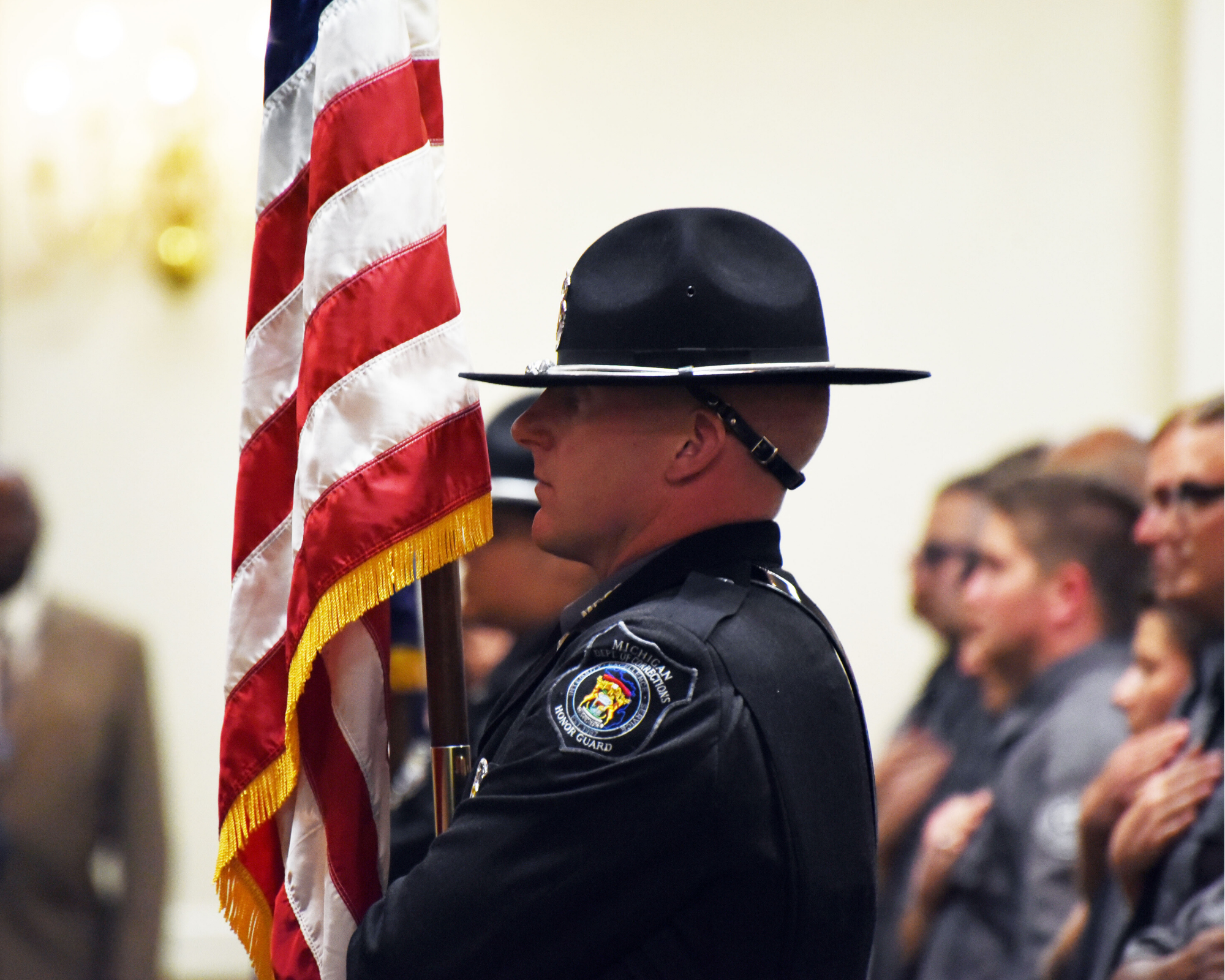
The MDOC, like many other large organizations, is taking steps to protect staff, family members, prisoners and visitors by suspending or postponing large-scale events. Postponed events have included the March 16 Lansing recruitment open house, the March 20 Corrections Officer Academy graduation and the March 27 Wayne County Returning Citizen Job Fair.
The May 5 Employee Appreciation Banquet and Warden?s Meeting has also been cancelled.
The Employee Recreation Day event scheduled for June at the Royal Scot in Lansing and the Employee Recreation Day event scheduled for September in Brimley have been cancelled as we continue to focus on precautions to protect the health and well-being of staff.
Most training, other than firearms requalification, has been postponed.
The department?s corrections officer training academies will now be starting again with social distancing measures and enhanced cleaning and sanitizing efforts in place. The Upper Peninsula academy will begin June 29 and the Lower Peninsula academy will begin July 13.
UPDATE: Visitation Restrictions
In an effort to protect the health of staff, prisoners and the public, the MDOC suspended visitation at ALL correctional facilities statewide on March 13.
This also includes outside volunteers and other tours and groups who routinely come into the prisons.
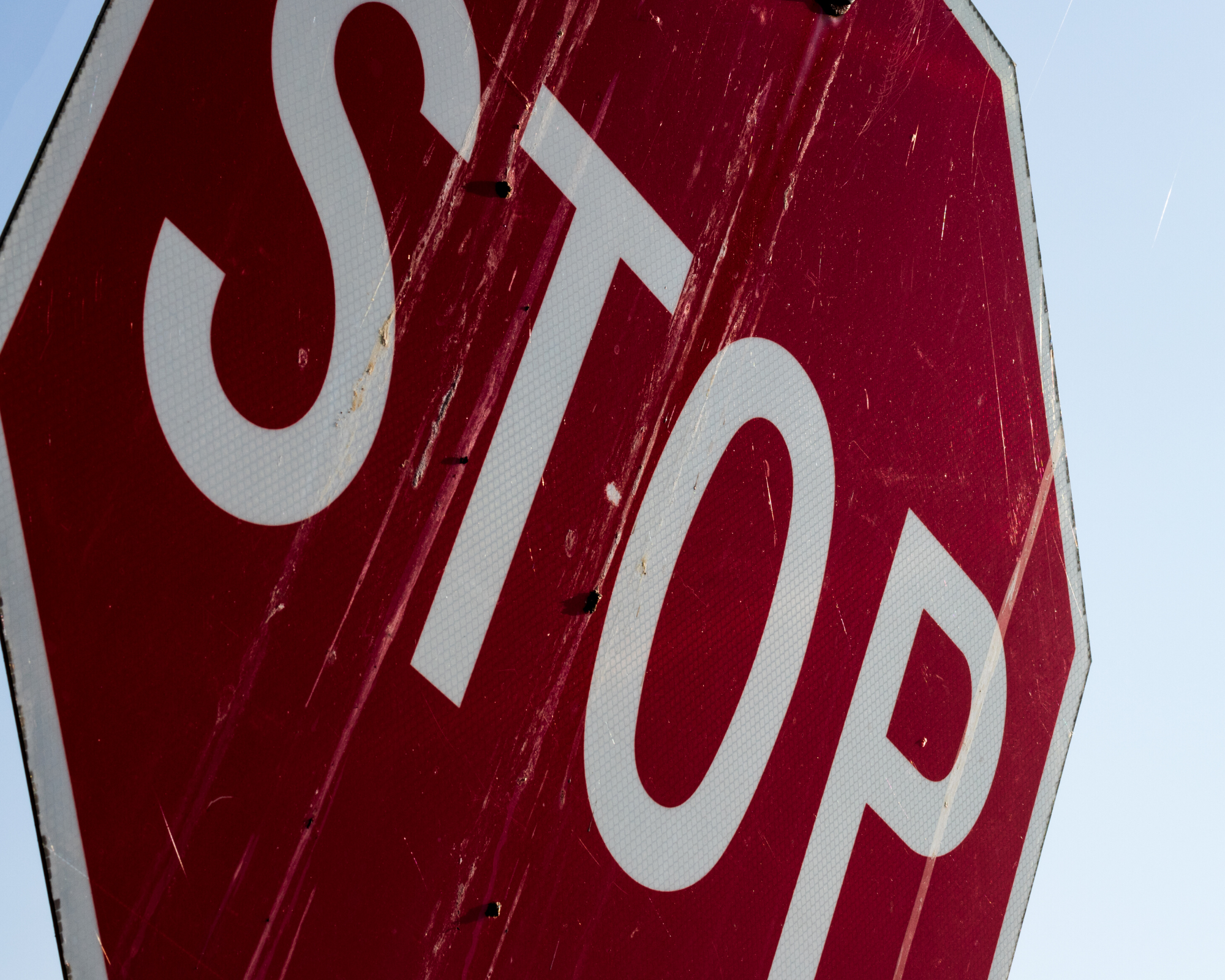
?This was not a decision we arrived at lightly, as we understand and recognize the importance of family contact with the prison population,? said MDOC Director Heidi Washington. ?Our primary concern has to be public safety and reducing the number of people who enter our facilities is a key factor in limiting the potential spread of this illness into our prisoner population.?
The department will monitor the situation to determine when visits will be restored.
During the period without visits, the department worked with GTL and JPay to provide enhanced services for prisoners to communicate with family and friends.
In addition, all staff working at facilities are being asked a series of screening questions and have their temperature checked before being allowed entrance into a facility. For those with a temperature above 100.4, they will not be allowed to work.
A press release on visiting restrictions was sent out statewide on March 13. You can find a full version of that release here.
NEW: Video Visitation and Online Scheduling Pilot
Updated July 23, 2020
After suspending visitation at all correctional facilities to protect the health of staff, prisoners, and the public, Director Heidi Washington convened a Visiting Operations Committee to develop recommendations for reactivating prisoner visits.
The committee recommended establishing a pilot project to evaluate the use of video visitation technology and online scheduling of prisoner visits.
Video visiting is just one step towards safely restoring contact between prisoners and their loved ones. It is not the intent to replace contact visiting in the future, but a safe option while we are amid this pandemic.
We do not have a time frame for returning to in-person visits at this time.
The MDOC?s contract with GTL for prisoner phone service includes the deployment of video visitation technology and use of the GTL Visitation Management (scheduling) Software.
The following MDOC Facilities will serve as pilot sites for video visitation:
- Women?s Huron Valley Correctional Facility (WHV)
- G. Robert Cotton Correctional Facility (JCF)
- Chippewa Correctional Facility (URF)
- Richard A. Handlon Correctional Facility (MTU)
- Ionia Correctional Facility (ICF)
- Parnall Correctional Facility (SMT)
- Duane Waters Health Center (DWH)
The initial phases of the deployment involve the installation of infrastructure and device configuration at each pilot site.
Concurrent with the video visitation deployment, the MDOC and GTL will configure the GTL Visitation Management (scheduling) Software. The GTL Visitation Management (scheduling) Software allows approved visitors to schedule their in-person and video visits in advance. This software will be used by all MDOC Facilities.
Additional information regarding visiting operations, timeline for implementation, the number of visits, visiting hours will be released in the very near future.
We know there are still many questions regarding visiting operations as we have received many correspondences from people eagerly awaiting news on visits.
The Visiting Committee is still planning and making recommendations and as decisions are made updates will be released.
What it is
Coronaviruses are a large family of viruses. Some cause illness in people, and others, such as canine and feline coronaviruses, only infect animals. Rarely, animal coronaviruses that infect animals have emerged to infect people and can spread between people. This is suspected to have occurred for the virus that causes COVID-19. Middle East Respiratory Syndrome (MERS) and Severe Acute Respiratory Syndrome (SARS) are two other examples of coronaviruses that originated from animals and then spread to people.
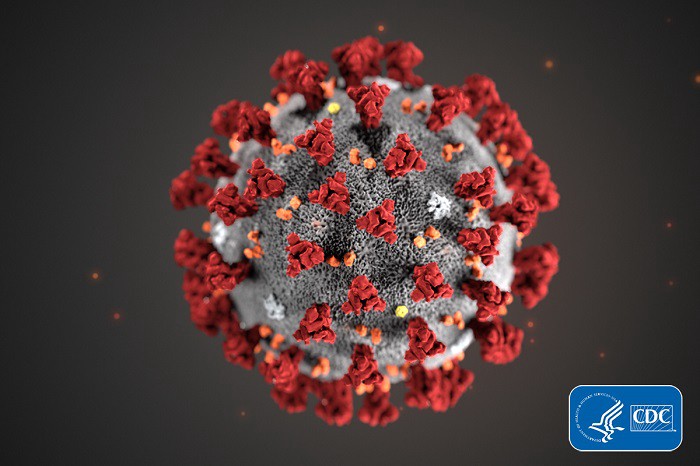
SARS-CoV-2 is a new coronavirus that has not been previously identified. This virus causes the disease of COVID-19. The virus causing COVID-19 is not the same as the coronavirus that commonly circulate among humans and cause mild illness, like the common cold.
This virus was first detected in Wuhan City, Hubei Province, China. The first infections were linked to a live animal market, but the virus is now spreading from person-to-person. It?s important to note that person-to-person spread can happen on a continuum. Some viruses are highly contagious (like measles), while other viruses are less so.
Transmission: The virus that causes COVID-19 seems to be spreading easily and sustainably in the community (?community spread?) in some affected geographic areas. Community spread means people have been infected with the virus in an area, including some who are not sure how or where they became infected.
The virus is thought to spread mainly from person-to-person via respiratory droplets, resembling the spread of influenza.
It would be spread by:
The air by coughing and sneezing.
Close personal contact, such as touching or shaking hands.
Touching an object or surface with the virus on it, then touching your mouth, nose, or eyes.
It is possible that a person can contract COVID-19 by touching a surface or object that has the virus on it and then touching their own mouth, nose, or possibly their eyes. According to the World Health Organization (WHO), coronaviruses may survive on surfaces for just a few hours or several days. Many factors will influence this, including surface material and weather.
Symptoms: People who have been diagnosed with 2019 Novel Coronavirus have reported symptoms that may appear in as few as two days or as long as 14 days after exposure to the virus. Most cases are occurring approximately five days after exposure. Symptoms consist of fever, cough, and difficulty breathing (shortness of breath). Pneumonia appears to be the most frequent serious manifestation of infection. Older people and people of all ages with severe underlying health conditions such as heart disease, lung disease and diabetes, seem to be at higher risk of developing serious COVID-19 illness.
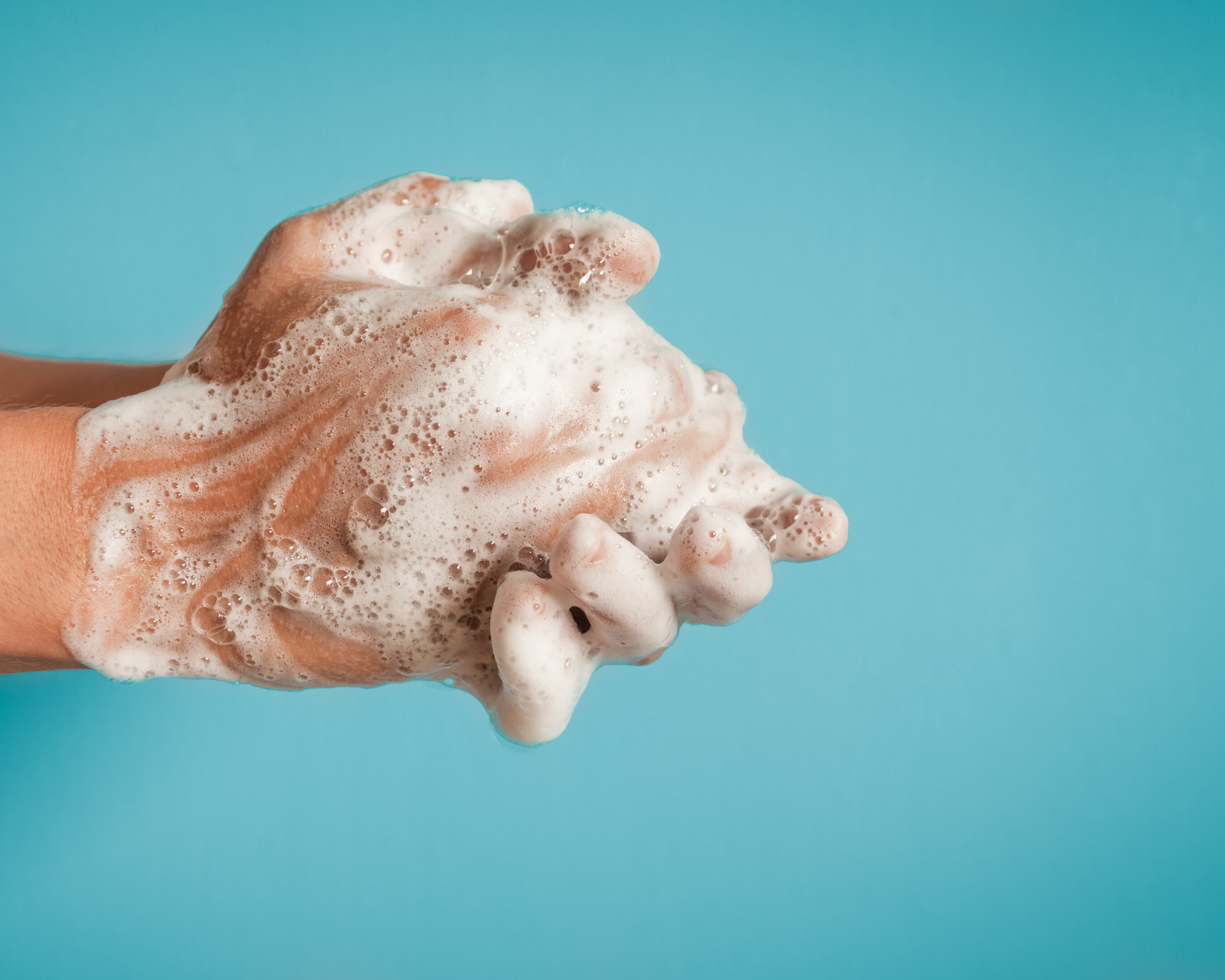
Prevention: Steps you can take to prevent spread of flu and the common cold will also help prevent 2019 Novel Coronavirus.
Wash your hands often with soap and water. If not available, use hand sanitizer.
Avoid touching your eyes, nose or mouth with unwashed hands.
Cover your mouth and nose with a tissue when coughing
Stay home if you are sick.
Routinely clean all frequently touched surfaces in the workplace, such as workstations, countertops, keyboards, and doorknobs. Use the cleaning agents that are usually used in these areas and follow the directions on the label.
No additional disinfection beyond routine cleaning is recommended at this time.
Additional information and resources can be found at the CDC, Michigan Department of Health and Human Services (MDHHS), and World Health Organization (WHO):
Coronavirus Disease 2019 (COVID-19)
Coronavirus disease 2019 (COVID-19) is a virus (more specifically, a coronavirus) identified as the cause of an?
www.cdc.gov
Coronavirus – Coronavirus
Description: Coronavirus – Coronavirus
www.michigan.gov
Home
WHO’s primary role is to direct international health within the United Nations’ system and to lead partners in global?
www.who.int
Informational Posters
These posters from the CDC regarding coronavirus (COVID-19) have been distributed to worksites across the department.
